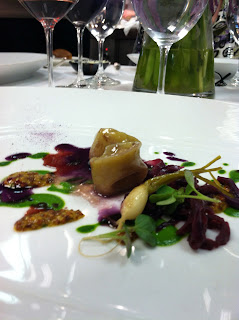History was made in Chicago just a short time ago. Sure,
there was that election and all, but I’m thinking less politically and more restaurant
related.
After nearly 25 years, Charlie Trotter's, the restaurant responsible
for establishing Chicago as a fine dining destination, closed. At the beginning
of the year, Chef Trotter announced seemingly on a whim that he would be
closing his landmark, eponymous restaurant.
A month or two later, I heard him on WBEZ (Chicago’s NPR affiliate).
During his interview, he explained that he wanted to close his restaurant to
pursue an advanced degree in philosophy.
But he also told stories about people from the neighborhood
suddenly coming by now that they heard he was closing. And he talked about how
so many Chicagoans who had never visited the renowned restaurant were now
scrambling to make reservations. Where had they been the past few years, he
seemed to be asking? And why hadn’t they come in sooner?
And when I visited the restaurant with three friends and
talked to chef myself a month later, I got the same impression. Had we visited
the restaurant before, he asked the four of us? Two of us had, two had not.
Focusing on the two that hadn’t, he asked why they hadn’t come previously. As
for the two of us who’d been, he wondered why we hadn’t eaten there more often.
The chef’s kind but insistent questioning and his comments
during his radio interview reminded me of the celebrated Chicago chefs who had
passed through his kitchen, from wunderkind Grant Achatz to Graham Elliot.
These chefs, of course, enjoy hype, packed dining rooms, and plenty of press.
And I wondered, did Trotter feel left behind? Had business dropped off, or did
he merely miss being the most celebrated Chicago chef?
As we ate mere feet from him at the kitchen table, he reminded us that he was the chef who had created the concept of the kitchen
table (as well as the idea that patrons should pay more for the privilege of
being tucked into a corner of an action-packed restaurant kitchen.) And he
introduced Americans to degustation and seasonal menus. Undoubtedly, he
contributed more than the equivalent of a paltry appetizer to the American
dining scene.
But was his demise unavoidable, as the New York Times
suggested? Had he truly been left behind?
Sure, Homaro Cantu and Achatz had built and expanded on
their teacher’s precepts and philosophy, attracting the attention of the media
and the adulation of foodies in the process. But just because his students had
moved beyond him, was it inevitable that he close his doors?
I believe it could have gone differently.
In France, senior chefs are often treated like cultural
treasures. And closer to home, Alice Waters has certainly yielded little ground
to the thousands of chefs and restaurants across California, and the States,
that follow her farm to table and seasonal approaches.
So why did Trotter relinquish his undisputed position as
father to Chicago’s contemporary dining scene? Perhaps he really did want to
pursue another career. But based on some of his comments, I wonder if he was disappointed
to no longer be considered the wunderkind of the Second City. Or was it simply
that the restaurant was no longer filling its tables?
It’s this last question that leads me to suggest that the
restaurant’s closing is the hallmark of a missed marketing opportunity. The
restaurant could have been billed as a classic, as the place where Chicago’s
renowned chefs cut their teeth. Tourists and foodies could have been appealed
to. Sure, visit Alinea or Graham Elliot while you’re in town, he could have suggested,
but don’t miss the chef and restaurant that launched them both, Charlie
Trotter.
Given Trotter’s reputation for possessing a healthy ego,
it’s surprising that he or his team never attempted this approach. Or maybe he
didn’t want to have to try too hard to persuade diners to visit his restaurant
and devour his perfect creations. Or, maybe he just wants to study philosophy.
But I’m not so certain.






